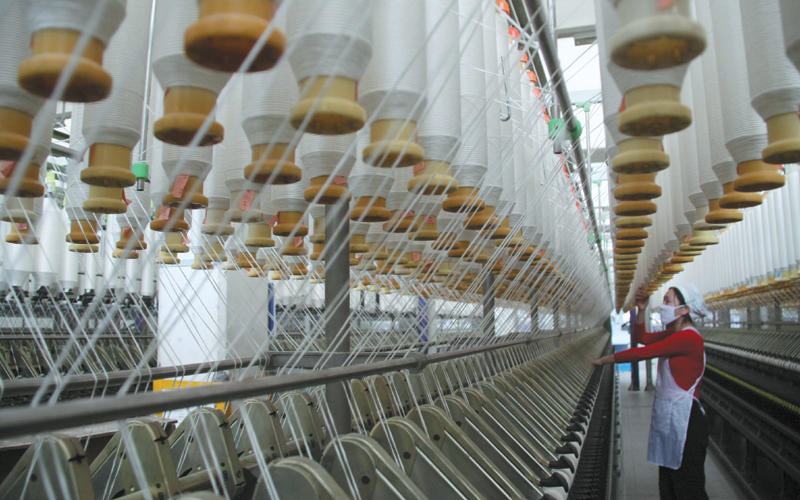For 14 years, Li Xingwei has ridden his motorized tricycle every day to and fro in Nantong Domestic Textile Town, carrying goods from vendors in the market to the logistics service center.
Li is just one of the many deliverymen in the world’s third-largest textile market in Nantong, Jiangsu province, who form an important link in the e-business chain for the textile trade.
The growth of the local textile industry echoes the “Internet Plus” action plan in Premier Li Keqiang’s government work report this year, which calls for the integration of the mobile Internet, cloud computing, big data and the Internet of Things with modern manufacturing.
The city government plans to expand emerging markets in 2015 to promote integration of the e-business model and the real economy, said Song Lewei, Party chief of the city’s Tongzhou district, where the textile town is located.
“The domestic textile industry is a traditional business, and local companies are shifting their focus from manufacturing to innovation,” Song said. “Also, e-commerce is an emerging business. The combination of the tradition and the Internet is a direction toward which Tongzhou’s textile business is heading.”

Ten years ago, the Tongzhou government unveiled policies that encourage development of privately owned companies, thanks to which thousands of start-ups emerged and a complete textile industry chain was developed around Chuanjiang township.
Nantong Domestic Textile Town opened in Chuanjiang in 2006, combining textile trading, exhibitions, R&D and logistics, with an annual contracted value of 60 billion yuan ($9.7 billion).
More than 150,000 orders are delivered each day in the market, with the top three logistics companies — SF Express, STO Express and Daily Express — handling about 90,000 orders among them.
According to Alibaba, owner of China’s largest online shopping portal Taobao.com, the value of the online textile trade volume hit 60 billion yuan last year, with half of sellers and 70 percent of the goods from Nantong.
An e-business park was built in the textile town last year. It has attracted 42 start-ups, 37 of which have started operation. They enjoy rent subsidies and services including training programs and conference facilities.
Guo Xiaofeng, operations supervisor of the park, said it is cooperating with many online shopping websites such as Taobao, Tmall and JD.com to support and regulate local companies.
Industry insiders said the e-business model means not only a change in sales channels for the textile industry but also leads to a series of changes in design, property protection, logistics, operation models and marketing concepts.
Ye Zhumao, manager of a local textile company, said previously many online shops were managed by couples who stayed at home most of the time and knew little about the latest fashion trends or online sales rules.
Now they have moved to the e-business park, with access to professional training and services.
“We will provide more preferential policies, cheaper venues and more public services,” said Shao Aijun, director of administration for Nantong Domestic Textile Town. “We also want to expand our business abroad.”
The administration also plans a 40-hectare logistics park in the town and is negotiating with a number of national industry leaders to improve its logistics network.
Contact the writers at zhangzhao@chinadaily.com.cn
